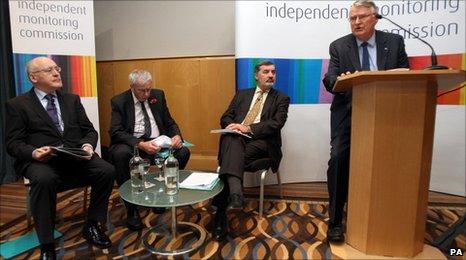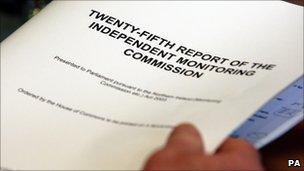Independent Monitoring Commission watchdog put to sleep
- Published

Dick Kerr and his three fellow commissioners delivered their latest report
With violence by dissident republicans rising, the timing of the decision to scrap the Independent Monitoring Commission may appear a little odd.
However, during a period of government cost-cutting, it makes economic sense.
One of the four commissioners has been flown from the US to the UK for dozens of meetings.
By his own estimate, the 75-year-old American, Dick Kerr, has spent 2,400 hours in the air.
Closing down the commission also makes political sense.
When the international commission was set up six years ago, the focus was on the Provisional IRA.
It was a delicate time in the peace process, as unionists agonised over whether to share power with Sinn Fein.
Less relevant
They wanted an independent assessment of the IRA's commitment to peace, and the Independent Monitoring Commission (IMC) was able to provide it.
For some time now, the commission's view has been that the IRA is dormant, and committed to politics - not violence. Their reports have therefore become less relevant at Stormont.
In blunt terms, if the main point of the IMC was to be the IRA's watchdog, then it now appears to be pointless.
Indeed, in the latest 46-page IMC report, the IRA section consisted of only four sentences.
Instead, most of the report was taken up with dissident republican groups. The six-monthly reports shed light on these groups, as well as the UVF and UDA.
Most of the information has already been in the public domain, but the IMC often gives out more details than the police.
The most recent example of this was the revelation that £100,000 had been found in a house in Lurgan used by dissidents.
The IMC will therefore be missed by many journalists. Some politicians will miss it too.
Northern Ireland's First Minister Peter Robinson has said that the role of providing an update to the public on the threat posed by republican - and loyalist groups - needs to be filled by someone else.
Sinn Fein will not lose any sleep over the shutting down of the IMC. The party was never convinced it was truly independent.
The four-man commission consisted of an American, an Irishman, an Englishman and a Lord from Northern Ireland:
former Assembly speaker Lord Alderdice;
former deputy director of the Central Intelligence Agency, Dick Kerr;
former secretary general of the Department of Justice in Dublin, Joe Brosnan; and,
former deputy assistant commissioner of the Metropolitan Police, John Grieve.
They were a colourful, hard-working group, packed with experience and readily accessible to the media.
Analysis
However, at times, their use of language made them sound like part of the establishment.

The commission has produced 25 reports since its inception
Mind you, their analysis of the security situation served a useful purpose.
Lord Alderdice, having lived through Northern Ireland's Troubles, was often the best judge of how the dissidents compared to the Provisional IRA. He ensured that the dissident threat was always kept in context.
Since the IMC was set up in 2004, there have been dramatic developments in the peace process - in particular the decommissioning of IRA, UVF and UDA weapons.
Now, in the spring of next year, the IMC itself will be decommissioned.
- Published4 November 2010